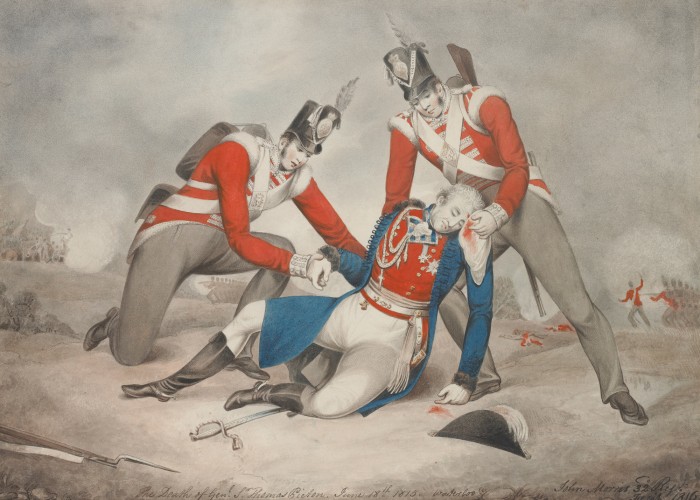Death of General Picton
This is a coloured engraving depicting the death of Sir Thomas Picton. Lieutenant General Sir Thomas Picton was one of the senior Allied officers killed at the Battle of Waterloo.
The death of General Picton could have been disaster. An experienced Peninsular general, he inspired his men to stand against d’Erlon’s Corps. Defeat at this point would have lost Wellington the battle.
His death occurred whilst he was haranguing the men of his fifth division, during Count Drouet d’Erlon’s 1st Army Corps threatening assault on the right centre of Wellington’s line. Picton was shot by a French soldier. The musket ball flew into his left temple and he fell lifeless to the ground. On stripping his body for burial, it was noticed by a surgeon that he had been injured quite severely on the 16 June during the action at Quatre Bras. Another musket ball had scoured his abdominal wall, causing much bruising and breaking two ribs. This painful wound was bound up and none but his manservant knew of it. Picton had wanted to lead his division in the final battle.
It was rumoured that a French infantryman was seen rifling Picton’s pockets as he hit the ground.
This coloured engraving depicts the dead general being removed from the battlefield by two private soldiers of the 32nd (or Cornwall) Regiment. The 32nd Regiment were part of Picton’s division, one of the three battalions comprising General James Kempt’s Brigade. The brigade was situated adjacent to the road from Brussels to Charleroi. The 32nd took 370 casualties from a total strength of 689 (54%) at Waterloo and Quatre Bras. They were an experienced unit and linked up with the 79th and 28th Regiments in Kempt’s Brigade.
Picton was a brave, tough Welshman, and in some men’s eyes rather a coarse and controversial figure. Despite his ultimate acquittal, he had been involved in a scandal over the torture of a young mulatto girl in Trinidad at the beginning of the century. Although not one of Wellington’s favourites, his zeal in action and personal bravery were never in doubt. So prominent was his military reputation that on the day of Waterloo Bonaparte was anxious to know of Picton’s whereabouts.
-
Curatorial info
- Originating Museum: Cornwall's Regimental Museum
- Production Date: c. 1817
- Material: Ink on paper
- Technique: Hand-coloured engraving
-
Use this image
You can download and use the high resolution image for use in a non-profit environment such as a school or college, but please take note of the license type and rights holder information below
- Rights Holder: Cornwall's Regimental Museum
- License Type: Creative Commons
Find it here
This object is in the collection of Cornwall’s Regimental Museum







